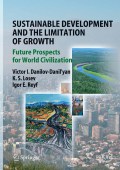
Sustainable development and the limitation of growth: mankind's greatest challenge
Danilov-Danil'yan, V.I.
Losev, K.
Reyf, I.E.
2007 marks the 20th anniversary of the G.H.Brundtland Commission report that broke new ground by addressing the issue of sustainable development as a meansof avoiding an ecological catastrophe. This led to a multitude of political declarations, documents and scientific articles while Agenda 21 – adopted in 1992 in Rio de Janeiro – has been accepted by the governments of more than 100 countries. Sadly, however, this has not prevented certain recent dangerous trends, nor have the wider public, journalists, business circles or politicians grasped the urgency of the problem. It is therefore important to make humanity understand its real place in the natural environment and the gravity of the ecological threat before us. The exclusive role of natural ecosystems is a key factor in the maintenance of the biospheric equilibrium. The current global crisis is largely caused by their dramatic decline by 43% in the past hundred years. Addresses one of the most urgent and critical problems of our civilization Highlights the importance of global environmental stability Shows humanity itsreal place in the natural environment Emphasizes the gravity of the ecological threat before us Demonstrates the need to move from modern industrial thinking to new ecological thinking Takes a holistic approach to the global economiccrisis
- ISBN: 978-3-540-75249-3
- Editorial: Springer
- Encuadernacion: Cartoné
- Páginas: 210
- Fecha Publicación: 01/10/2008
- Nº Volúmenes: 1
- Idioma: Inglés
